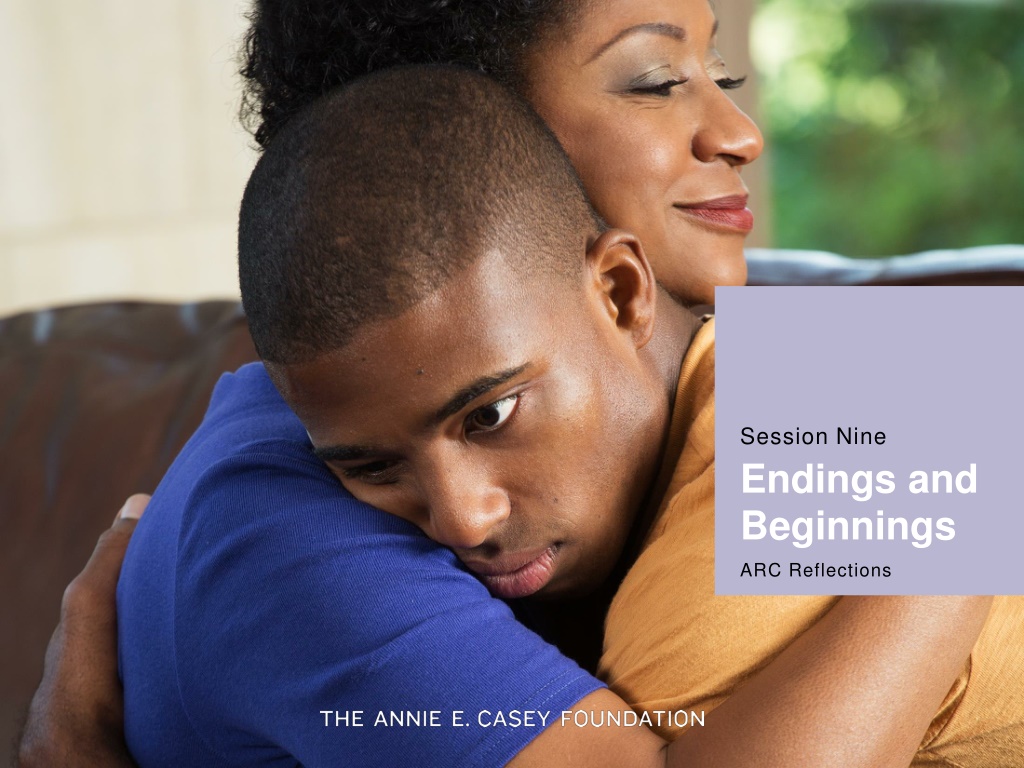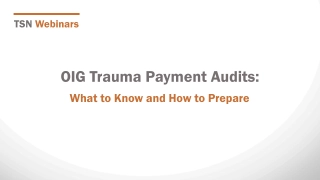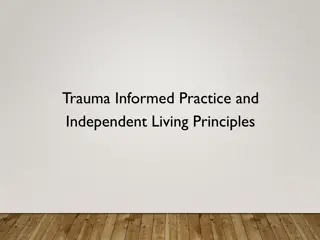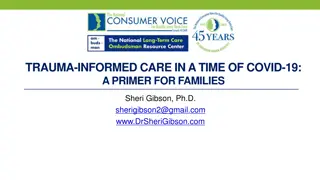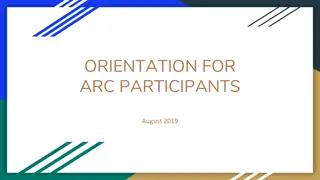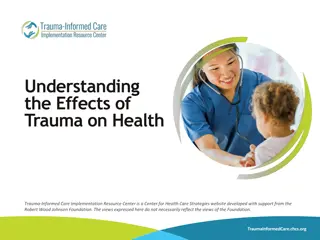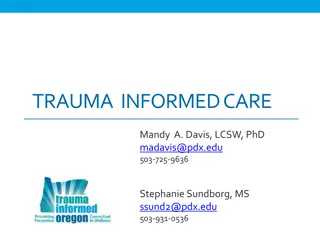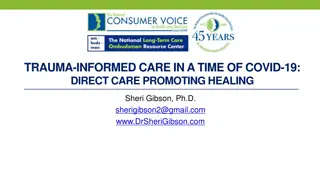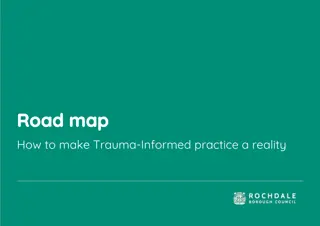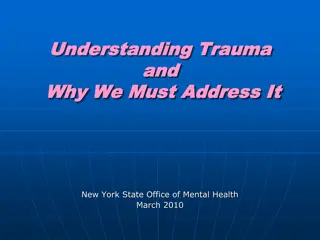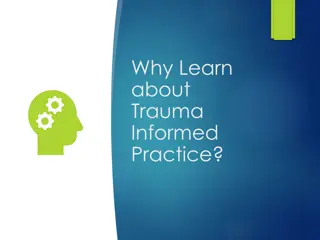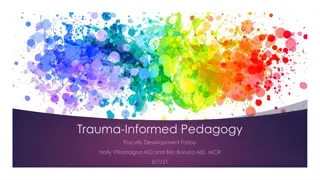Understanding ARC Reflections: A Framework for Trauma-Informed Care
Explore the ARC framework, Attachment, Regulation, and Competency, developed for working with children and teens who have experienced trauma. Learn about the ARC-informed caregiver training curriculum, warm-up activities, opening check-ins, and strategies to support a child's sense of self and identity. Join sessions focusing on self-reflection, theme exploration, and practical take-home exercises to enhance caregiving skills.
Download Presentation

Please find below an Image/Link to download the presentation.
The content on the website is provided AS IS for your information and personal use only. It may not be sold, licensed, or shared on other websites without obtaining consent from the author. Download presentation by click this link. If you encounter any issues during the download, it is possible that the publisher has removed the file from their server.
E N D
Presentation Transcript
Session Nine Endings and Beginnings ARC Reflections
ARC Reflections ARC, or Attachment, Regulation and Competency, is a framework for working with children and teens who have experienced trauma. Developed by Margaret Blaustein and Kristine Kinniburgh of the Justice Resource Institute, ARC builds on the resilience of children, teens and families ARC Reflections an ARC-informed caregiver training curriculum for foster parents, kin and other caregivers was written by Blaustein and Kinniburgh with support and consultation from the Annie E. Casey Foundation 2
Welcome This group will meet nine times for two hours each time Please attend all sessions Each session will include the following segments: Warm-up Opening check-in Review and report back Theme of the day Self-reflection Take home Practice Closing check-in 3
Warm-Up Pick one word from the pile of cards on the table. In pairs or small groups, talk about how the word you have picked applies to: - You, in your role as a foster parent - The child or teen who you now or will care for 5
What Is Your Energy Right Now? Totally Comfortable Great Match +10 +5 0 z -5 -10 Really Terrible Match Uncomfortable 7
Getting Comfortable If your energy is comfortable and a good match, great! If not, what can you do to get it there? 8
Review Identity develops in stages over time Trauma can have a profound effect on sense of self and identity and can influence our lens and filter for ongoing experiences Foster parents can significantly influence a child s or teen s sense of self by helping him or her to: Explore his or her unique qualities Build positive experiences Tolerate vulnerability Hold on to his or her past, present and future 10
Report Back In small groups, discuss your practice from last week: What went well? What was challenging? What was something you noticed? 11
Checking In on Olivia Olivia has just turned 10 and in three months, she will be transitioning to live full time at her aunt s home. After a year of increasing contact, her aunt has committed to becoming Olivia s legal guardian Olivia says she is excited and nervous and her behavior has gotten more challenging as the time to move to her aunt s nears. She is clingier with her foster mother, struggling with bedtime separation again, but also seems quieter and more remote at times 13
Olivias Foster Parents Olivia s foster parents have mixed feelings about her upcoming transition Her foster father feels positive about the change. He likes her aunt. Though he will miss Olivia, he believes it is a good move for her Olivia s foster mother is surprised by how sad she is feeling. Although she always knew this was a short-term placement, she finds herself feeling angry at the aunt for no reason. She is sure she can provide a better home. She is concerned that Olivia will be hurt more than she already has been 14
Olivias Aunt Olivia s aunt is committed but anxious. Her own children are grown and it feels like a long time since she s had a child in the home Her relationship with Olivia s mother, her niece, was always strained; they disconnected years ago She was surprised when child welfare approached her about Olivia, but has grown to really care about this child and believes she can do right by her 15
What Have Endings Been Like for You? Think about different transitions in your life: ending relationships, moving to a new home, saying goodbye to friends, losing family members, leaving your parents home Take a moment to reflect: What has the ending experience been like for you? 16
Types of Transition for Children and Teens in Foster Care Reunification with biological family Placement with kin as a permanency option Transition into a (pre-)adoptive home Transition into another foster home Higher level of care (group home, residential, hospitalization) AWOL (being absent without leave or running away) Aging out/emancipation 18
Transitions Are Complex TRANSITIONS MAY FEEL EASIER IF TRANSITIONS MAY FEEL HARDER IF 19
Transitions Are Complex TRANSITIONS MAY FEEL EASIER IF TRANSITIONS MAY FEEL HARDER IF They are expected They are unexpected There is time for planning There is no time for planning The transition plan feels positive Some are not happy about the plan Ending feels like a good thing It is out of your control Everyone is supported There are fears about the next placement Everyone can safely express whatever emotions they have Information is lacking You feel good about your time together There are negative relationships You ve had hard feelings aboutthe child s placement with you You ve had good endings in the past You ve had negative endings in the past 20
What Do You Think? How might children s or teens history influence their experience transitioning from your home? 21
A Reminder Foster Kid 22
Transitions Are More Complicated for Children and Teens Who Have Experienced Trauma They may struggle with: A history of multiple losses A negative lens of self ( Will everyone reject me? ) A negative lens of others ( Will my next person be safe? ) Fears about the future Coping with stress and big feelings Easy activation of the Express Road Reaching out for help Managing change and unpredictability 23
How Do Kids Cope? It depends on the child or teen. Some show: Indifference( Whatever ) A pre-emptive strike ( I don t care about you ) Denial and disconnection from fears, sadness or worry ( Everything will be great ) A return to challenging behavior Signs of giving up ( I m never going to get what I want anyway ) Separation fears and clinginess Signs of shutting down 24
What About You? In what ways do you think your own experiences might influence how you respond to transitions? 25
More Than One Person Is Transitioning When a child or teen leaves your home, everyone in your family is affected Change is often complicated Keep in mind how your family s ways of coping may influence the transition process 26
Start Early For most children and teens in foster care, placement is temporary. From the first day of placement, support the skills that will lead to successful transition later Nurture connections between the child or teen and his or her broader world (biological family, providers, community connections) Value your role. Good, loving relationships (even those that are not long lasting) are a strong predictor of positive outcomes When transitions are inevitable and anticipated, weave conversations about this reality into interactions along the way, at age-appropriate levels and as the child or teen can tolerate 28
Help the Child or Teen Prepare Information is powerful. When we know what to expect, we can better prepare ourselves and stay on the main road Don t avoid the conversation because you fear the child or teen can t handle it. Tune in to your own distress tolerance Invite questions. Ask the child or teen what he or she is wondering about. If you don t know how to answer the questions, write them down and try to find answers Ask your own questions. The more you know, the better you can support the transition 29
Help the Child or Teen Prepare Think about the information a child or teen may want: Who. Who will be in the new home? What are they like? Are there animals? Will I still be able to speak to you and my family? Where. Where is the home? Where will I sleep? How far is it from here? Will I still see my friends, my pet, my teachers, my therapist? What. What do new places (house, school, neighborhood) look like? Will this be permanent? What can I take with me? When.What is the timing? Will someone tell me when it s going to happen? How. Can I visit first? How long will I stay here? How will I get there and who will go with me? How will I pack my stuff? Do I have any choice? Do I have to stay there? Capture whatever you can concretely. Ask for pictures, look at maps, make a list of important people and phone numbers, etc. 30
Reflect on Your Time Together Take some time to honor this period of the child s or teen s and your life Create concrete items the child or teen can take with him or her: a scrapbook, photo album, timeline, memory book Include pictures of the child or teen in your own family archives. Let the child or teen know that he or she has had an impact Create opportunities to talk about reactions to the change the child s or teen s, yours, members of your family 31
Talk About Staying Connected A question that you, your family and/or the child or teen may be sitting with: What is next? Pay attention to your feelings. What level of contact with the child or teen after he or she leaves feels comfortable to you? Talk with child welfare staff to understand any boundaries about ongoing communication Be clear with the child or teen: How will ongoing connections be feasible via phone calls, letters, visits, birthday cards, gifts? If the relationship will end with the placement, don t let this be a surprise If you need help, get support in communicating about this 32
Pay It Forward In the time the child or teen has lived with you, chances are you and he or she have built something together. Send pieces of that forward Communicate about helpful strategies with case managers, new caregivers and providers. What helps the child or teen succeed? Ask the child or teen to think about what works for him or her, too; discuss how to use these strategies in the new home Make a list with the child or teen of favorites (activities, recipes, places), likes or dislikes and skills. Help brainstorm ways to share these with new caregivers Consider allowing the child or teen to take objects of significance to him or her from your home 33
Olivia The time is drawing closer for Olivia to transition to her aunt s home, and her foster parents have been helping her sort through her belongings. Together, they have gone through her keepsake box and created a scrapbook of her favorite artwork from the past three years. Olivia picked three pictures to leave behind and she and her foster mother framed them together. 34
Olivia Although Olivia has had a fair amount of time to get to know her aunt, questions keep coming up. Her foster parents gave her a shoebox that serves as a Question Box, along with a pad of paper. Every time she thinks of a new question, she writes it down. During their evening chat time, they go through her questions. For any question her foster parents can t answer, they make a plan with her to find out. 35
Olivia Olivia has been worrying about how to pack. She has strong memories of her clothes and toys being packed in garbage bags and a teddy bear being left behind when she was small The week before she moves into her aunt s home, Olivia s foster father takes her to a department store and lets her pick out two large purple duffel bags and one smaller one to carry her special dolls and animals. At home, they make a list of important things she wants to be sure not to leave behind 36
Olivia In the weeks before the transition, Olivia, her foster parents and her aunt have gotten together to talk about many different things: Olivia s favorite meals, where her friends live and their phone numbers, her bedtime routine and so on. Although her aunt already knew a lot of this, Olivia feels better hearing them repeated and watching her aunt write them down One thing they have been talking about is whether Olivia can still speak to her foster parents. Her aunt has said Olivia can call whenever she wants. Her foster parents plan to speak to her once a week in the beginning 37
Olivia The day comes and Olivia s bags are packed. Her aunt arrives to take her to her new home 38
Wrap-Up Not all endings are the same Transitions can be particularly challenging for children and teens in foster care You can support a positive transition by: Starting early Helping the child or teen prepare Reflecting on your time together Talking about ongoing connection Paying it forward 39
Our Own Goodbye In this group, you have learned many skills. All of you have so much to offer Remember, your greatest and most important teachers will be the children and teens in your care. Stay curious 40
Olivia Olivia is 17 and will graduate from high school next month. She and her aunt have formed a strong, loving relationship over the years. Recently, Olivia has cautiously reconnected with her mother, who is newly clean and sober and living in her community. Olivia has kept in touch with her last foster parents over the years although the communications have been less frequent 42
Olivia Olivia s aunt has kept her in dance classes throughout high school since Olivia still loves the arts and performing Olivia was recently accepted to the state university. Next year, she will live at home, attend school part time and continue her job teaching young children at her studio 43
Olivia Olivia s story did not begin when she was placed in foster care and it did not end when she left it. But her time there influenced the path she took Never underestimate the role you play with all the Olivias out there 44
Question Think about your time in this group. If you had to pick one sentence that will stick with you, changed your thinking, resonated or will influence how you care for children and teens in the future, what would it be? Write it down 47
TAKE HOME What is one sentence (idea, concept or something you have learned) that you can take away from today? Write it in your log.
